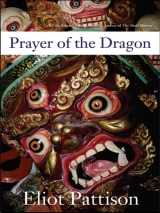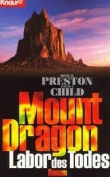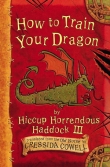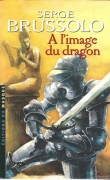
Текст книги "Prayer of the Dragon"
Автор книги: Eliot Pattison
Жанр:
Полицейские детективы
сообщить о нарушении
Текущая страница: 9 (всего у книги 24 страниц)
Chapter Five
The nightmare came in glimpses, bringing terror such as he had not felt since his early days in the gulag. Lokesh’s belly was awash with blood. A familiar hand, spotted with age, lay lifeless twenty feet from Shan, a splinter of rock piercing its palm. One arm was twisted and thrown backward in an impossible position for the living. Blood-specked stones occupied the space where his legs should be.
Shan’s world was turning red. This was the way the universe looked to the dying, draped in a veil of blood.
“No!” Something flashed inside Shan and with a stab of pain he pushed himself up. “Lokesh!” he cried, wiping his temple on his sleeve, realizing the veil of blood was dripping off his own forehead.
Yangke and Hostene were already trying to clear the rocks away, uncovering Lokesh’s head, bending over him, pulling the stones off him. They carried him inside their shelter.
The old Tibetan coughed. His eyes flickered open but he did not seem to see. “The Tara!” Lokesh’s plea came in a hoarse croak. “Save the goddess!”
Hostene began rummaging in his pack as Yangke placed a rock under Lokesh’s head to elevate it. The Navajo produced a shirt that he began ripping up for bandages. Then he extracted a small metal flask.
Shan took Lokesh’s injured hand, opening the bent fingers, cradling it in his own before, with one swift motion, Yangke extracted the shard of stone. Hostene quickly poured some of the flask’s contents on the wound and they sat for a long, agonizing moment, letting the blood ooze onto the palm before Yangke began wrapping it with the makeshift bandages.
Shan had seen Lokesh pummeled by guards in prison and by hail in the mountains, seen him with the skin flayed from his leg after he’d fallen down a steep scree but had never seen the desperate agony that now radiated from his eyes. As he cradled his friend’s wounded hand he felt numb. It was the same paralysis he had felt forty years earlier holding the hand of his dying father, who had been fatally beaten by the Red Guard. The hard words they had exchanged in the stable echoed in his head.
He was vaguely aware of movement around him, of Hostene examining Lokesh, then gesturing to Yangke, asking him to brace the old Tibetan, of the Navajo removing his belt and wrapping it around Lokesh’s other wrist. There was a sudden jerk, a whimper of pain from the gentle old Tibetan, then Lokesh’s head rolled toward Shan, fixing him with a small forced grin. “The goddess,” he groaned again before he passed out. But the goddess was dead.
Shan became aware that Hostene was trying to pry away his fingers from Lokesh’s arm. “He’s going to be all right, Shan,” the Navajo declared. “No broken bones. Just bad bruises and that hand. His eyes are clear, no serious concussion. His shoulder was dislocated, that’s what hurt him so much. I put it back. An old trick from my horse-riding days.”
As the words sank in, Shan’s paralysis melted away. He began to study his surroundings. They were trapped in the little gully by a wall of loose rocks nearly ten feet high. Yangke, climbing the wall, began to clear away the stones at the top.
“No!” Shan cried, jumping up to tug at the young Tibetan’s leg. “We’re dead! Make them think we’re dead!”
Yangke descended but gave no sign of understanding.
“Before the roar of the rocks,” Shan explained, “there was another sound, an explosion. The avalanche was no accident. It was aimed at us.”
For a moment Hostene and Yangke stared in confusion, then they grasped Shan’s meaning. The avalanche had been an act of murder.
“But they will have seen us escape,” Hostene pointed out.
“No. Whoever did this would not have risked being anywhere below when the explosive detonated. The dust from the avalanche will have obscured the view from above. He must believe we are still in that cave. The explosion was timed to trap us there, or kill us coming out. It would have been successful if Lokesh had not remained outside.”
“So what would you have us do?” Hostene asked.
Shan bent over his old friend. “Sit. Wait. Don’t speak above a whisper. If he was conscious, Lokesh would be praying for the goddess that was destroyed.” He entwined Lokesh’s beads around his limp fingers. As he did so his friend awoke for a moment and beckoned Shan with his head. “The kora,” he whispered, then he lost consciousness again.
Ten feet away Hostene sat with the blue pack between his legs, fidgeting with the small video camera from the cave. They watched the small rectangular screen as a young woman with long black hair gathered at the back in a knot conferred with a thin Chinese man with graying hair beside the Tara that had just been obliterated.
“She always complained when I used the camera for casual shots. We are not tourists, she would say. She only brought it to obtain footage she could use in class,” Hostene explained. He turned toward Lokesh. “What did he mean, before he passed out?”
A kora. Lokesh had disagreed with Shan’s approach to finding the killer, to applying logic and deduction to the mountain, because he thought such tools useless, even misleading. He had his own way of understanding the mountain. “The statue and painted words were once part of a pilgrim’s path.” The little shrine would have been a way stop, probably a place of vigil for pilgrims, a rest station for those following a path laid out by lamas or saints in another century.
“Is that important?”
The words of the fleeing miner came back to Shan. The man murdered earlier that summer had been found in front of an old painting, as had the miner the year before. “It links all the murders.”
“Have there been others?” Hostene asked.
Shan explained. “Four people have been killed. All on the kora, the pilgrim’s path. All have had their hands severed.”
Hostene’s face darkened. He gazed at Lokesh again, then turned back to the camera and adjusted the volume so they could dimly hear a rich, energetic woman’s voice point out the features of the sacred rock. The Navajo’s eyes watched the little screen with affection, pride, and reverence. Once the woman’s head jerked to the left and anger flashed in her dark eyes. Someone off-screen apologized in Tibetan.
“Every day she was here she gained energy,” Hostene said. “She was making a great discovery. Professor Ma wasn’t sure what she meant. Something very old was here, she said. She told us it would be clearer to us in a week or two.”
“Where would she have gone?” Shan asked. “The night of the killings.”
Hostene stared at the screen as if he were watching a ghost.
“The moon was bright. That night as it rose she said there was a reason why many of the Navajo ceremonials are performed only at night. She was still there, by our fire, when I climbed into my sleeping bag.” He looked up at Shan. “If she thought we had all died, she might still be working, finishing her research.”
“Surely she would go home. Or at least go down the mountain, to notify the police,” Yangke interjected.
“Not Abigail. Not this mountain,” the Navajo replied cryptically. “Not this summer. She knew Tibet better than I do. She would have known there were no police who could help. She would continue working, thinking she could evade the killer. Her research was too important to her.”
“But she left all her equipment in the cave,” Shan pointed out.
“Not all of it,” Hostene said. “A digital camera with a small tripod is missing. She likes to travel light. Tashi and I usually carried the other equipment.”
“And she took her backpack,” pointed out Yangke.
“But may not have done so voluntarily,” Shan reminded them. He saw the anxiety in Hostene’s face and tried to force hope into his voice. “We need to keep all possibilities in mind.”
After a moment Hostene said, “The killer doesn’t have her, he can’t have her. She must have been sure we’d all died and so she kept working. It’s her way. She would have returned to the camp, been terrified by all the blood, and run to hide somewhere for a day or two. If she went back and found no sign of us, she knows what Tibetans do with bodies. She also knows she’ll never have another chance to complete her work. She knows what I would want.”
“Then the question is where is she working?” Shan replied.
They continued to watch the video with new, intense interest.
Abigail Natay, even in miniature, was an impressive woman. Like her uncle, she had a quiet strength about her. Shan could sense her confidence, see the fire in her eyes, as she was buoyed on a flood of exuberant commentary. Though the Tibetans had had the technology of the wheel for centuries, they used it primarily for prayer wheels, she explained. They chose to muster armies of monks instead of armies of warriors. Near the end of the scene she seemed to catch herself, glanced at the camera, and self-consciously brushed back a long black lock that had drifted across one high cheekbone.
Shan said, “You mentioned before that Tashi got drunk. Surely you didn’t bring bottles of liquor with you.”
“Just the brandy in my flask,” Hostene replied. “It was the miners. I never actually saw him drinking but twice I saw him come back to camp when he thought we were sleeping, and he was staggering.”
In the next video Abby stood before another smooth rock face, but this one was adorned only with barely legible words.
Yangke leaned forward, studying the image intently. “I’ve roamed this mountain for years,” he said. “But I have never seen this place.”
“You said nothing about a pilgrim path,” Shan said.
The Tibetan’s face clouded. “It’s not well known.”
“You mean the people of the mountain try to keep it a secret. Why?”
Yangke gazed toward the summit. “It’s from another time, another world.”
“Why?” Shan repeated.
“In the country we live in, when Tibetans reveal that something is important to them, those who watch us will destroy it. Besides,” he added after a moment, “the path is lost to us. It disappears into the grass a few miles up the slope. No one has ever found the rest of it. All those who knew its course died when our temple was destroyed fifty years ago.”
“Abby and Tashi would take the camera and disappear for hours,” Hostene said. “She was making new discoveries every day, finding Buddhist things, Bon things, ancient things.” The three men did not need to articulate the question that hung in the air. Had Abigail discovered the route of the ancient pilgrim path?
Hostene checked the bandage on Lokesh’s hand. Shan continued to watch the screen. “I thought you said no one was looking for gold,” he said after a moment. Abigail stood in front of a tunnel framed by old timbers. The camera panned, showing old metal implements, rusting to dust, and an old iron-framed chest whose boards were nearly rotted away.
“I said ‘not exactly,’ ” the Navajo replied. “Some of the very old prayers spoke about mining gold for the gods.” He paused, cocked his head, and looked out over the pile of rocks.
Shan thought he heard an insect at first, singing in the languid heat. Then, for a moment, he thought it was something on the tape. He touched the power button of the recorder. The sound came from just over the high rim of the rocks that had trapped them and grew louder as they listened, resolving into a familiar pattern. Someone was energetically reciting a mantra.
Moments later a scalp of shaggy black hair appeared, then a small surprised face, then shoulders draped in reddish rags. The chant faltered as the man peered at them over the edge, then ducked down. He repeated the motion several times, bobbing up and down, disappearing then returning, as if to get a better idea of the creatures trapped below. He disappeared and the mantra picked up again, this time with the rhythm of a cheerful song.
“Rapaki!” Yangke exclaimed. “Stay here or you’ll frighten him away,” he warned, then began scaling the loose, treacherous pile of rubble.
Shan and Hostene, sitting beside Lokesh’s prostrate form, waited as Yangke spoke in encouraging tones, gesturing as if to a skittish dog. When his words had no effect on the singsong mantra, he began pulling rocks from the top. They would have to clear a path if they were to carry Lokesh safely over the rubble.
After several minutes the strange ragged figure reappeared, veering in and out of view as he lifted and moved stones, gradually approaching Yangke, still chanting, until finally the two men were working side by side. He had the wild appearance of one who lived exposed to the elements, his skin leathery, his hair long and uneven. The rags on his back had once been a robe, though it now bore so many patches of different colors and fabrics that it appeared as if he had tied a quilt around himself.
When Rapaki finally noticed that Shan was slowly advancing toward him, he ducked behind Yangke, then tilted his head to peek around Yangke’s back, grinning, his eyes wide. He ducked in and out as before, using Yangke as his shield. Then he froze, his carefree expression becoming solemn. He had seen Lokesh. He advanced without fear, seeming not to notice Shan, until he stood before Lokesh, studying him, his head tilting one way then the other. Then he spun about and disappeared behind the rocks.
Yangke gazed after him, then with one hand made a corkscrew motion next to his temple. “Totally crazy. I guess we’d be like that too if we’d lived in a cave for nearly forty years.”
But the action of the hermit was not crazy at all. Yangke and Shan were still clearing rocks when Rapaki returned, clutching the stems of a plant that he crushed and placed under Lokesh’s nose. The old Tibetan sneezed, snorted, and woke up. His eyes lit with pleasure at the sight of the ragged figure before him. Rapaki was a figure directly out of the old tales, the hermit beggar with brambles in his hair.
“Rapaki, Rapaki, Rapaki,” the hermit said as Lokesh was propped against the rock wall. Rapaki paused, gazing at Hostene as though for the first time, then abruptly he jammed a finger into Hostene’s chest, repeating his own name again several times, as if it were a protective mantra. He then studied Shan with the same intense gaze, jumped toward him, jammed a finger into Shan’s chest, jumped back to Lokesh, and began whispering something very quickly under his breath. He rose warily as Yangke approached.
“What is he saying?” Hostene asked.
Shan paused for a moment, confused. Yangke was trying to question the hermit about the avalanche, about whether he had seen anyone on the slope above but Rapaki seemed unable to hear him. “He seems only to speak in song and mantra,” said Yangke.
Soon they had cleared a path sufficiently that they could carry Lokesh across the rubble.
“He has to be taken back to the village, to Gendun and Dolma,” Shan told Yangke.
“We can make a litter, with poles and shirts, then the four of us can carry him.”
“No. Hostene and I must remain here. The murderer must be up here. And his niece, too.”
“It will take all day,” Yangke said with a sigh.
Rapaki materialized at Shan’s side and put his hand on Shan’s arm as he pointed in the opposite direction from the village. Lokesh looked up. Shan recognized the words the hermit now sang, in ever-louder tones, as he pointed with increasing vigor up the slope. It was a healing mantra. Rapaki might have lost all capacity for human conversation but he knew how to convey his meaning to the deities.
Rapaki had not been the first to use the cave they reached an hour later. The soot of butter lamps was heavy on the ten-foot ceiling and stained the upper half of a vast mural on one wall portraying protector demons. They were in an ancient shrine, intended for more than a hermit’s dwelling. Despite his injuries, Lokesh would not settle onto the pallet offered by Rapaki. First he hobbled along the walls, greeting with low exclamations of delight the small statues standing in niches carved in the living rock and the altar made of a heavy beam set on rock pedestals.
“It’s Bon,” Lokesh declared as he gazed at the once-vivid painting. “Very old. For the mountain deity. I do not even recognize some of the demons,” he added as he gazed in confusion at one in the corner. He had once been a monk official in the Dalai Lama’s government and was as intimate with the pantheon of Tibetan deities as any lama. He might not be able to name the crimson-faced deity but Shan had seen it before, on one of the open-air rock faces in Abigail Natay’s video. Below the painting, on a roughhewn block of juniper, was an unbound book, a peche. Loose pages were strewn on the floor around it. Shan kneeled to study the pages. They were old, illuminated in still-brilliant colors.
It was not the old but the new that Shan was seeking. He had begun to wonder how the hermit survived. In the summer, the slopes might be full of berries, even wild grains, but winter in such a place would be brutal. He supposed that like the yaks and goats the hermit must migrate in the winter to a lower altitude. Then he saw a sliver of shadow in a corner. As Rapaki and the others helped Lokesh onto his pallet he picked up a butter lamp and slipped into the narrow opening.
The chamber beyond, adorned with more dim paintings on the walls, had once held butter, barley, and water in orderly arranged ceramic pots, the shards of which could be seen along the far wall. Rapaki’s arrangement was much more modern, and chaotic. The floor was littered with empty cans of beans, fruit, and soup, as well as empty sacks of plastic and muslin. Along one wall were unopened cans, and sacks of rice, not stacked but carelessly tossed in a pile, on top of which was a small round tin. Shan lifted the tin and opened it. It had once held hard candy and was edged with little yellow flowers. Lemon Freshies, it said in English.
There was crumpled paper in the trash heap, thirty or forty pieces, most of them labels from cans, most of those with writing on the white reverse side. Shan flattened one across his knee. At first he thought it was a sketch for a tangka, a sacred painting, for there were figures of deities and sacred symbols along the edges. But most of the paper was taken up by Tibetan words. He struggled through the first half, some of which was crossed out. He could not read all the cramped words but many phrases were familiar. It was a letter addressed to Tara, signed your secret Rapaki. Or more exactly, it was a draft of a letter to the deity. He unfolded five more of the labels. They were all similar to the first with minor changes. Some of them, he judged, were many years old.
“I always wondered how he fed himself,” a voice said from the shadows. “He’s gone,” Yangke added. “He took a bag and ran as if he were leaving for good. He suddenly seemed to be afraid of us.”
“Did these supplies come from Chodron?”
“Not a chance. Chodron hates him and would be pleased if he starved to death. He is a symbol of all that Chodron cannot abide.”
“It would not be difficult for a man like Chodron to get rid of him.”
“Not as simple as you may think. You don’t understand how small our village is. Rapaki is Dolma’s first son. She only sees him every couple of years, but she won’t let Chodron forget the relationship.”
Shan sifted through some of the empty cans. Most were small, containing simple, basic fare, but several newer ones contained more expensive items like lychee nuts and pickled onions. Nearest the door were plastic bags whose labels indicated they had held salted sunflower seeds. A small foil pouch had contained chewing gum. Some of the labels were worn, as if having rubbed together in a pack.
“Why would the miners give him supplies?” Shan asked.
“I didn’t know that they do. But to some he’s like a mascot, a good-luck charm. And at the end of the summer some of them don’t want to carry extra supplies out.” Yangke squatted before the pile of cans, probing them. “If they left food behind, he would know how to find it.”
Shan lifted the lamp and went to the far end of the chamber, where he saw newer supplies. An unused pad of paper. A cotton quilt with a pattern of pandas frolicking among clouds. A sealed pack of sweet biscuits. These were not the abandoned supplies of miners.
“There were stories in the village when I was younger, about Rapaki’s grandfather,” Yangke said as Shan moved back to his side. “He came back from his flock one day very excited about the paradise he would soon live in. Next morning he took a pack of food and left, never to be seen again. People said he had stolen gold from the gods and gone down in the world to spend it.”
“What,” Shan asked, “was the name of his grandfather?”
“Lobsang.”
Shan picked up one of the letters and extended it to Yangke, holding the lamp close. Rapaki had mostly written to the gods. But at least one letter, which appeared newer than the rest, had been addressed to his grandfather.
“Impossible,” Yangke said in a troubled tone. “Even if he survived to a great age the man would have died decades ago.”
“One of the great advantages of being Rapaki,” Shan observed as he rose to check on Lokesh, “is that you are not constrained by the possible.”
Shan let Hostene lead the way as the two of them climbed the slope an hour later. The Navajo had been about to leave the cave to search for his niece by himself when Shan had stopped him, explaining that Yangke would stay with Lokesh. There was no clear path through the complex network of ravines, high meadows, ice-fed springs, and long fields of wind-carved outcroppings, and soon they realized that the best clues to Abigail’s trail lay within the little silver video camera.
“Can you find these places?” Shan asked as they watched the first few scenes on the tape again. “Sometimes the same painting appears in more than one scene, as if she were revisiting them.”
“New theories occurred to her, and new interpretations. Sometimes she would be in the middle of studying one painting and find she had to go back to another she had visited two days before. I always offered to accompany her, but sometimes she refused. She said she would have to jog to cover the distance and didn’t want me to risk twisting an ankle. She didn’t think I shared her fervor for her work,” he said remorsefully. “When you spend your life behind a blanket I guess it’s hard to drop it, even to those who come back to the family.”
“A blanket?” Shan repeated.
“My wife used to say that in the last years before she died. There were many like me, like Abigail, who lived with the old ways when we were young and then went into the world to pursue careers outside the tribe. We chose other ways to live. On the map I didn’t go far, just a couple hundred miles, but it may as well have been ten thousand. Law school, prosecutor’s office, the state court. An entirely different universe from the one I grew up in. You learn not to speak with anyone about the sacred ways, the old ways, partly because they are secret, but also because they are mocked, because other people want to turn them into trinkets to use in schemes to make money. You learn to pull the Navajo blanket up and never speak about those things. If someone wants to discuss the Navajo you speak about the artists who make the blankets and pots, no more. I had two chants but I didn’t use them for nearly thirty years, except behind my own closed doors, to keep them alive.”
“Chants?”
Hostene, fixing his leathery face on the distant clouds, was silent so long Shan thought he would not reply.
“It is the way we speak with our holy ones. Something like a prayer, something like a song. One can last for days. The chanter recites from memory. The chants are handed down from one generation to the next, taught in quiet, dark places. Abigail said the Tibetans do the same thing. It has a very old feel to it, the learning of such things. I used to get shivers walking into the hogan, the house, of my teacher.”
“You mean you were a priest?”
“We have no priests. We have our chanters, the singers. If you need healing for a sickness caused by witches you go to the chanter of the Ghostway. If you want to protect your crop against frost you find the singer of the Starway. You always start with the Blessingway, to open the door to the holy ones.” He glanced self-consciously at Shan, as if surprised by his own words. They were not speaking only of blankets and pottery now.
“This was what Gendun was doing in that stable,” Shan observed. “For many days, he invoked the gods on your behalf, almost without stopping, every line he spoke different, every line from memory.”
Hostene scooped up a handful of loose earth and tossed some into the wind. “Kac tcike eigini eigini qayikalgo.”His voice was a whisper, his words aimed at the clouds. He caught himself and looked at Shan. “It is one of the phrases from my second chant. The Mountainway. Holy Young Woman sought the gods and found them, it says. On the summits of the clouds she sought the gods and found them.” His eyes welled with moisture and he looked away.
Shan said, after a moment, “Your niece was usually shown under trees in the videos, because the paintings were meant to be stops on the kora, resting places for pilgrims, offering water and shade. This high up on the mountain there aren’t many groves.”
But he had not realized how many there were until the two of them began seeking them out. They spent the rest of the daylight hours investigating a dozen groves scattered across the slope. Shan kept alert for signs of miners. They were approaching the mysterious place called Little Moscow that Yangke had mentioned to him. In late afternoon they paused in the shade of an outcropping to study the videos again, rewinding, fast-forwarding, noting a distinctive rock formation here, a gnarled stump there. A butterfly materialized before them, its scarlet and yellow wings quivering as it alighted on the camera. The Navajo froze. There was sadness in his gaze, as if the creature reminded him of the missing woman, but his eyes were also suffused with the same gentle childlike wonder Shan often saw on Lokesh’s face.
Shan did what he could to explain the images he recognized on the little screen, although often the Navajo woman on the tape explained them just as quickly. Fierce protector demons dominated many of the rock paintings. Four-armed Mahakala, Shrivi mounted on a horse, Rahula with a bow, dressed in human skins. Devotional images of the early Tibetan kings were depicted. Abigail had learned her icons well, accurately pointing out the details of the ritual hand gesture-a downturned hand in the earth-touching mudra-made by one ancient king, the gesture called Turning the Wheel of Law made by a blue-skinned saint. At several points she paused and drew Navajo images, discussing the similarities between the fierce deities embraced by both peoples and the taboos that had grown out of their beliefs.
It was midafternoon when Hostene touched Shan’s shoulder, then silently directed him down a nearby side path, into a rough gully that was devoid of any paintings, then into a maze of twisting, overgrown paths marked with inconspicuous chalk marks, low to the ground, at each turn, and finally through a narrow slit in two rock walls, onto what looked like a goat path. They emerged into a natural bowl abutting the rock spine that divided the mountain. At the base of the spine was a high pile of jagged stones, recently splintered, some blackened. They were at the old mine, or what was left of it.
“We could have been killed when the bolt of lightning struck,” Hostene said.
Thirty feet in front of them was the twisted, scorched iron frame of an old chest. On a rock wall opposite the debris was a large faded painting of a fierce protector demon riding a blue wolf, painted so its eyes seemed to follow the observer as he walked around the bowl’s circumference.
Shan studied the pile of rocks, the twisted iron, the splinters of old beams thrown across the clearing. “I have never seen lightning do such a thing.”
“We had nearly finished our work here and were examining a painting of a blue bull god some distance away. Professor Ma said he had left a set of cleaning brushes here. He retrieved the brushes, and when he returned he asked who had moved the equipment. Someone had taken all the old iron pieces, the trunk, straps for a forge, an anvil, old chisels and pry rods and piled them up in front of the tunnel, then added iron pry rods at the top of the pile, strapping three together like a flagpole.”
“Or, more likely, a lightning rod,” Shan said. He bent and scrutinized one of the scorched rocks, holding it under his nose. “Someone put explosives under the pile and used the lightning as a detonator. Whenever it went off whoever did this would be far away and could have an alibi. And they didn’t care who was nearby when it exploded.”
Hostene went to the far side of the pile and squatted, pulling away stones frantically, as if something had told him his niece might be underneath. Then, abruptly, he stopped, shuddering, gazing with a weary expression at the destruction.
“What had you found here?” Shan asked.
“Words painted on tunnel walls. Tashi and Abigail translated them but I never asked what they said. We had seen so many old writings already.”
“And gold?” Shan suggested.
“Not much. Just little nuggets here and there that seemed to have fallen in cracks or behind rocks and been forgotten. Abigail became very angry the first time Tashi touched one.”
“But he did take some-eight nuggets for the cairn by your camp.”
Hostene nodded. “Tashi changed her mind. He said it was the right thing to do, that it was what the old monk miners intended. He said it was how you recharged the prayers. That’s the word he used, ‘recharged.’ ”
“How much gold did you take?”
“Enough for four or five cairns, I guess. It wasn’t our gold, we all agreed we had no claim on it, that it would be wrong to do anything else with it. It wasn’t stealing. It was in line with what Abigail called the reverence of her work.”
Shan asked for the camera again, and found a scene of Abigail in front of the mine, speaking of Tibetan artisans who rendered exquisite goddesses out of gold, then of the Tibetan and Navajo shared reverence for turquoise, which they incorporated into both jewelry and holy images. The demon represented in the sole painting at the site was stated to be the main guardian of the powerful land deity that inhabited the mountain. Hostene lingered only a moment after handing the camera to Shan, then went to the head of the trail, impatient for Shan to finish.








